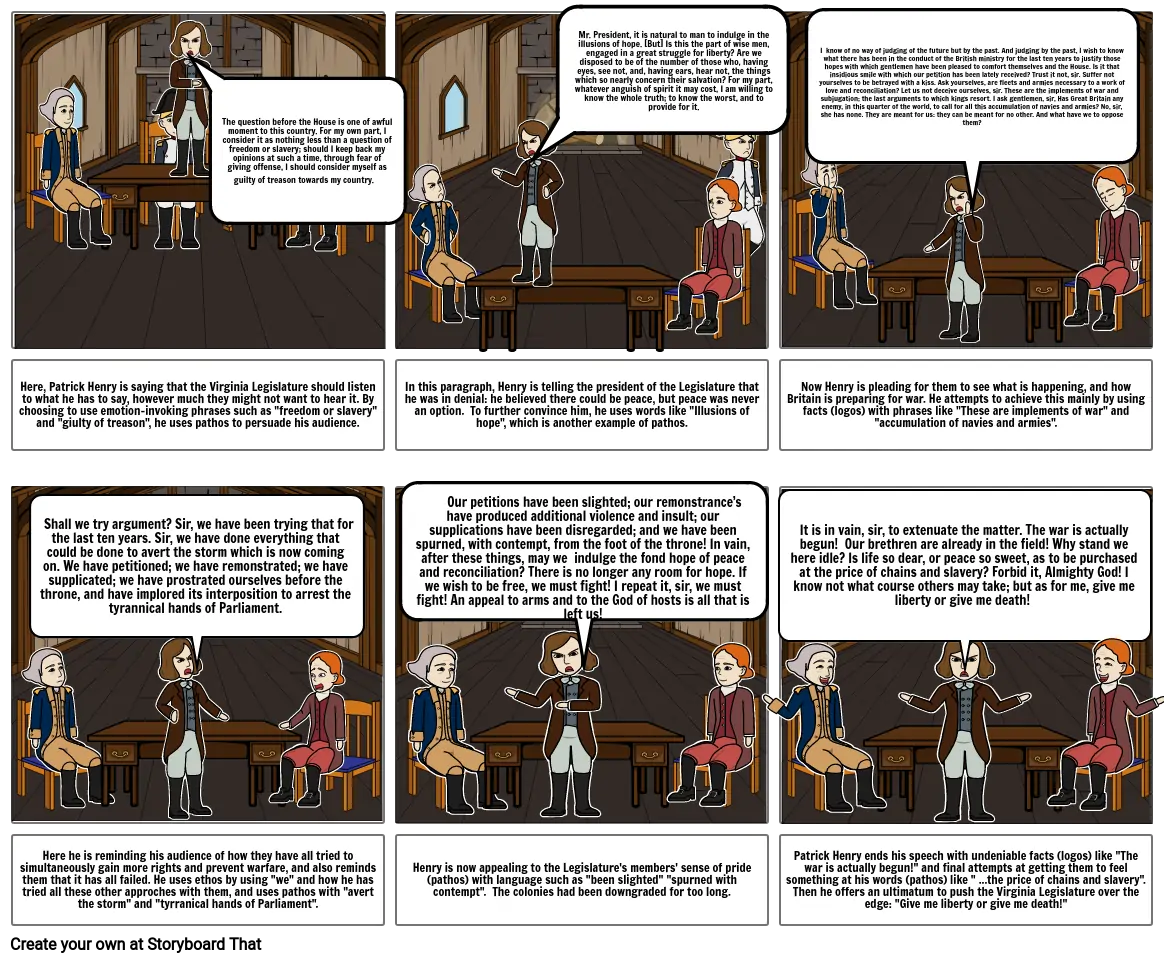Patrick Henry Speech

Siužetinės Linijos Tekstas
- The question before the House is one of awful moment to this country. For my own part, I consider it as nothing less than a question of freedom or slavery; should I keep back my opinions at such a time, through fear of giving offense, I should consider myself as guilty of treason towards my country.
- Mr. President, it is natural to man to indulge in the illusions of hope. [But] Is this the part of wise men, engaged in a great struggle for liberty? Are we disposed to be of the number of those who, having eyes, see not, and, having ears, hear not, the things which so nearly concern their salvation? For my part, whatever anguish of spirit it may cost, I am willing to know the whole truth; to know the worst, and to provide for it.
- I know of no way of judging of the future but by the past. And judging by the past, I wish to know what there has been in the conduct of the British ministry for the last ten years to justify those hopes with which gentlemen have been pleased to comfort themselves and the House. Is it that insidious smile with which our petition has been lately received? Trust it not, sir. Suffer not yourselves to be betrayed with a kiss. Ask yourselves, are fleets and armies necessary to a work of love and reconciliation? Let us not deceive ourselves, sir. These are the implements of war and subjugation; the last arguments to which kings resort. I ask gentlemen, sir, Has Great Britain any enemy, in this quarter of the world, to call for all this accumulation of navies and armies? No, sir, she has none. They are meant for us: they can be meant for no other. And what have we to oppose them?
- Here, Patrick Henry is saying that the Virginia Legislature should listen to what he has to say, however much they might not want to hear it. By choosing to use emotion-invoking phrases such as "freedom or slavery" and "giulty of treason", he uses pathos to persuade his audience.
- Shall we try argument? Sir, we have been trying that for the last ten years. Sir, we have done everything that could be done to avert the storm which is now coming on. We have petitioned; we have remonstrated; we have supplicated; we have prostrated ourselves before the throne, and have implored its interposition to arrest the tyrannical hands of Parliament.
- In this paragraph, Henry is telling the president of the Legislature that he was in denial: he believed there could be peace, but peace was never an option. To further convince him, he uses words like "Illusions of hope", which is another example of pathos.
- Our petitions have been slighted; our remonstrance’s have produced additional violence and insult; our supplications have been disregarded; and we have been spurned, with contempt, from the foot of the throne! In vain, after these things, may we indulge the fond hope of peace and reconciliation? There is no longer any room for hope. If we wish to be free, we must fight! I repeat it, sir, we must fight! An appeal to arms and to the God of hosts is all that is left us!
- It is in vain, sir, to extenuate the matter. The war is actually begun! Our brethren are already in the field! Why stand we here idle? Is life so dear, or peace so sweet, as to be purchased at the price of chains and slavery? Forbid it, Almighty God! I know not what course others may take; but as for me, give me liberty or give me death!
- Now Henry is pleading for them to see what is happening, and how Britain is preparing for war. He attempts to achieve this mainly by using facts (logos) with phrases like "These are implements of war" and "accumulation of navies and armies".
- Here he is reminding his audience of how they have all tried to simultaneously gain more rights and prevent warfare, and also reminds them that it has all failed. He uses ethos by using "we" and how he has tried all these other approches with them, and uses pathos with "avert the storm" and "tyrranical hands of Parliament".
- Henry is now appealing to the Legislature's members' sense of pride (pathos) with language such as "been slighted" "spurned with contempt". The colonies had been downgraded for too long.
- Patrick Henry ends his speech with undeniable facts (logos) like "The war is actually begun!" and final attempts at getting them to feel something at his words (pathos) like " ...the price of chains and slavery". Then he offers an ultimatum to push the Virginia Legislature over the edge: "Give me liberty or give me death!"
Sukurta daugiau nei 30 milijonų siužetinių lentelių

